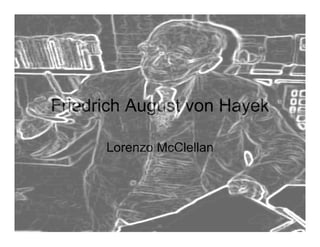
Friedrich August von Hayek
- 1. Friedrich August von Hayek Lorenzo McClellan
- 2. Life • Born in 1899 Vienna • Studied with Ludwig von Mises • Moved to London, then to Chicago and finally to Germany. • Won the Nobel prize in 1974
- 3. Business Cycle Theory • Hayek said “busts” were caused by bad central bank policy. • If the bank lowered interest rates too much, credit would be too easy to get. • People would make bad business assumptions, and the hollowness of these would eventually be discovered, resulting in a bust.
- 4. Hayek’s view of free markets and government planning • Hayek said that the problem of communism was that knowledge is diffuse. Central planning assumes the planners know everything necessary to run society. They do not. • Free markets allow people to each make decisions based on their area of expertise, resulting in a “spontaneous” order.
- 5. • “The peculiar character of the problem of a rational economic order is determined precisely by the fact that the knowledge of circumstances of which we must make use never exists in concentrated or integrated form but solely as the dispersed bits of incomplete and frequently contradictory knowledge which all the separate individuals possess.” • ---Hayek, The Use of Knowledge in Society
- 6. Influence • Hayek had many followers among the new conservatives of the 1980s. • Margaret Thatcher said his The Road to Serfdom was “what we believe.” • Ronald Reagan appointed many Hayekians to high office. • George H.W. Bush gave him the presidential medal of freedom.
- 7. More influence • Jimmy Wales, the founder of Wikipedia, has said that Hayek’s ideas of diffuse knowledge inspired him to create an encyclopedia anyone can edit.
- 8. Works Cited • http://freedomandwhisky.blogspot.com/1980c5.jpg (Illustration) http://www.montpelerin.org/images/photos/friedrichVonHayek2.jpg • http://www.brisbanetimes.com.au/ffximage/2007/04/26/jimmywales55_wideweb__470x364,0.jpg • studio52contact.blogspot.com • frmarkdwhite.wordpress.com • Hayek NY Times Obit by Sylvia Nasar • Thatcher’s People by John Ranelagh • Jimmy Wales interview on Youtube • ‘The Use of Knowledge in Society,” by F.A. Hayek • Hayek biography from Mises.org, by Peter G. Klein • Hayek article on econlib.org